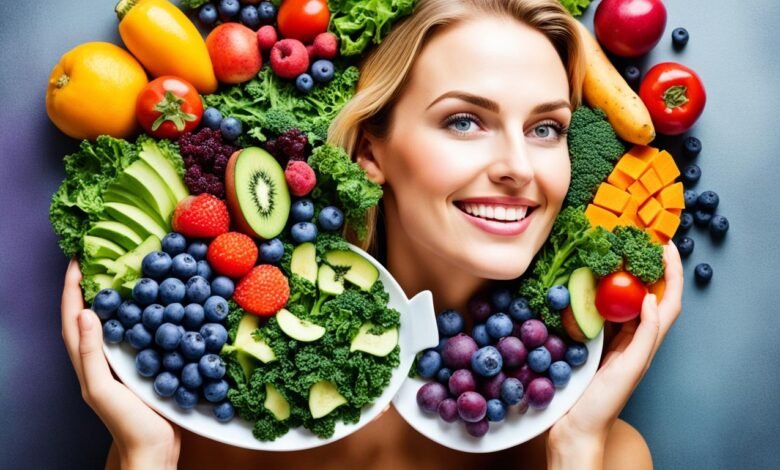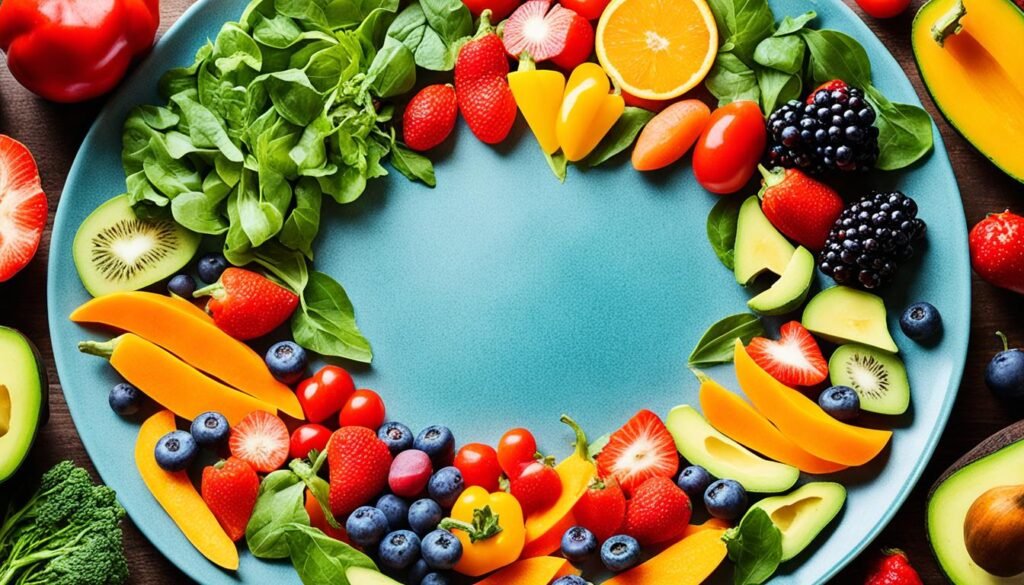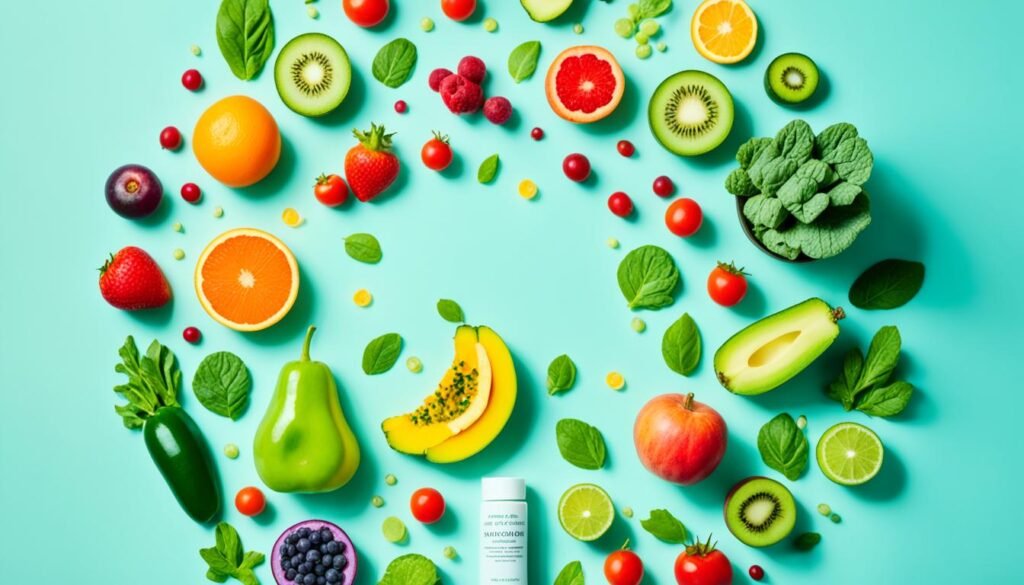
A healthy diet can help prevent acne and make your skin look better. While eating the right way may not clear up acne completely, it can help. Researchers think certain foods can make acne less severe. Acne shows up as bumps on your face, neck, back, or shoulders, mostly when hormones change during puberty. For some, acne goes away on its own. But for others, it can cause stress. What you eat can impact your skin. Certain foods affect your blood sugar and hormone levels, leading to more oil on your skin and inflammation. By choosing certain foods, you can lower the chance of breakouts.
We’ll talk about the top foods that can stop acne and make your skin healthier. But first, let’s understand what causes acne and how your diet can change your skin.
What Causes Acne?
Acne happens when pores in the skin get clogged with dead skin cells, too much oil, and sometimes bacteria. Puberty brings big hormonal changes that can trigger more sebum production by the oil glands. More sebum can lead to pimples and acne breakouts.
Acne comes in two main types: whiteheads and blackheads. Whiteheads are small, white bumps that are covered by skin. Blackheads are open pores, looking like dark spots on the skin. Not washing the face well, family history, and eating poorly can also lead to acne. But not everyone agrees that these are the only reasons for acne.
To stop and treat acne, we need to know what causes it. We should focus on dealing with the hormonal shifts, too much sebum, and blocked pores. This can help people manage their acne and have better skin.
The Role of Hormonal Changes in Acne
Big hormonal swings in puberty can make acne worse. These changes make oil glands kick into overdrive, producing too much sebum. This mixes with dead skin and bacteria, leading to clogged pores and acne.
The Influence of Oil Glands and Pores
Sebaceous glands make sebum, an oil that keeps our skin soft. If they make too much sebum, it can get mixed with dead skin and bacteria. This mix clogs the pores and ends up causing acne.
Oily skin doesn’t always mean worse acne. Hormones and the size of our pores also matter. A good skincare routine and finding the right treatment can help manage acne, whatever your skin type.
How Does Diet Affect the Skin?
What you eat really matters for your skin’s health. The foods you choose affect how your skin looks and feels. Some foods can quickly raise your blood sugar. This leads to higher levels of IGF-1, which can make your skin produce more oil. It also makes you more likely to have acne.
A diet heavy in Western foods, like fast food and sugary items, has been linked to acne and skin inflammation. Eating these items often can make acne problems worse.
Eating foods that don’t spike your blood sugar is better for your skin. Foods like whole grains, legumes, and fresh fruits and vegetables are good examples. These keep your blood sugar steady, which is great for your skin.
It’s also important to eat foods rich in zinc, vitamins A and E, and antioxidants. They fight skin inflammation and help your skin stay healthy. Include foods such as pumpkin seeds, spinach, blueberries, and salmon in your diet. These can improve your skin and lessen your chances of acne.
What Foods Help Your Skin?
Eating the right foods can keep your skin healthy and lower the chance of pimples. Focus on foods that won’t cause quick rises in blood sugar. Whole grains, legumes, and fresh, unprocessed fruits and veggies are very good for your skin.
These foods won’t suddenly spike your blood sugar, thus helping to avoid acne. They also give your skin the nutrients it needs to stay healthy.
| Foods | Nutrients |
|---|---|
| Yellow and orange fruits and vegetables | Vitamins A and E, antioxidants |
| Spinach and other dark green leafy vegetables | Zinc, antioxidants |
| Tomatoes | Vitamin A, antioxidants |
| Blueberries | Antioxidants |
| Whole-wheat bread, brown rice, and quinoa | Complex carbohydrates, antioxidants |
| Turkey | Zinc, vitamins A and E |
| Pumpkin seeds | Zinc, antioxidants |
| Beans, peas, and lentils | Zinc, antioxidants |
| Fatty fish like salmon and mackerel | Zinc, omega-3 fatty acids |
| Nuts | Zinc, antioxidants |
However, what helps one person may not be the best for someone else. Some foods might cause acne in certain people. If you want to change your diet for your skin, see a doctor or a skin specialist first. They can give you advice that fits your body’s needs and warn you about any allergies you might have.

Do Any Studies Support These Claims?
Many studies have looked at how our diet affects acne. They show some foods might help stop or improve acne. We need more research for clear guidelines. Still, these studies give us clues about how certain foods and nutrients can help.
The Role of Low-Glycemic Diets
A low-glycemic diet can really make a difference in acne symptoms. Foods like whole grains, legumes, and fresh fruits and vegetables do not spike blood sugar. This helps keep insulin levels stable and reduces acne-causing sebum.
Zinc and Acne Severity
Zinc is key for your health, and low levels might mean worse acne. Eating zinc-rich foods like shellfish, seeds, and nuts can balance zinc levels. This could help lessen acne severity.
Vitamins A and E for Acne Reduction
More vitamin A and E in your diet could lessen acne. Vitamin A is great for skin and controls sebum. Look to yellow/orange fruits, veggies, and green leafy vegetables for A. Vitamin E, an antioxidant, can protect skin. Find it in pumpkin seeds, avocados, and almonds.
Antioxidants and Omega-3 Fatty Acids for Skin Health
Antioxidants and omega-3s can help your skin. Antioxidants in fruits, veggies, and green tea fight free radicals. This keeps skin healthy. Omega-3s, in fish, nuts, and seeds, lower inflammation, which is good for acne.
Continued Research and Future Guidelines
We’re far from having all the answers about acne and diet. People’s bodies and skin are all different. So, what works in one person might not in another. Talking to a healthcare expert is the best step. They can give advice that matches your personal health needs.

| Study | Findings |
|---|---|
| 1 | Following a low-glycemic diet can lead to significant improvements in acne symptoms. |
| 2 | Zinc-rich foods have been linked to the severity of acne, with low levels of zinc associated with more severe cases. |
| 3 | Increasing the intake of vitamins A and E has shown potential in reducing acne severity. |
| 4 | Antioxidants and omega-3 fatty acids have been found to reduce inflammation and improve acne symptoms. |
Foods to Avoid or Limit to Prevent Acne
Keeping clear skin means choosing the right foods. There are certain foods that can cause acne. By avoiding these, you can help keep your skin clear. Let’s look at some foods you should be careful of.
High-Glycemic Foods
Some foods can make your blood sugar spike quickly. This is bad for your skin because it can make more oil and inflammation. Avoid foods like potato fries, milkshakes, and sugary cereals like cornflakes.
Dairy Products
Cow’s milk, low-fat milk, and skim milk might not be so good for your skin. They have things in them that could cause acne. Try almond milk or oat milk instead of dairy.
Fast Foods
Fast foods are often not the best for us. They’re high in bad carbs, sugar, and fats which can make acne worse. Cut down on burgers, fries, and sugary drinks to help your skin.
Chocolate
Chocolate might not be great for everyone’s skin, especially if it’s full of sugar and dairy. If you think chocolate could be making your acne worse, try to eat less and see if your skin gets better.
Alcohol, Caffeine, and Energy Drinks
Drinks like alcohol, caffeine, and energy drinks are not the best for clear skin. They can mess with your hormones and make your skin inflamed. It’s better to drink water and only have these sometimes.
In short, dodging high-glycemic foods, dairy, fast foods, chocolate, and certain drinks can improve your skin. By eating and drinking what’s good for you, you can have healthier, glowing skin. But don’t forget, a good skincare routine is also essential for clear skin.
Foods to Eat to Prevent Acne and Get Clear Skin
Eating certain foods can help prevent acne and keep your skin clear. Here’s what you should include in your diet:
Omega-3 Fatty Acids
Foods with omega-3 fatty acids fight inflammation. They include fish like salmon, mackerel, and sardines. Walnuts and flaxseeds are also great sources.
Antioxidants
Antioxidants fight off harmful toxins and reduce skin inflammation. Add foods like bell peppers, strawberries, kiwi, and green tea to your daily meals.
Vitamin E
Vitamin E protects your skin. Foods such as pumpkin seeds and avocados help keep your skin healthy and protect against cell damage.
Selenium
Foods rich in selenium help your skin too. Eat Brazil nuts, broccoli, and seafood like crab and shrimp to support healthy skin.
Zinc
Zinc is vital for skin development and oil control. Add shellfish, seeds, nuts, poultry, and whole grains to your diet for clearer skin.
Probiotics
A healthy gut is key to good skin. Probiotic foods like kimchi and kefir improve gut health, which then helps your skin.
Phytoestrogens
Phytoestrogens help your skin by acting like natural estrogens. Find them in foods like flax seeds and tempeh, as well as in fruits and vegetables.
These foods can make a big difference in your skin health and acne prevention. But always talk to a doctor or dermatologist before making big changes to your diet, especially if you have special dietary needs or allergies.
| Nutrient | Food Sources |
|---|---|
| Omega-3 Fatty Acids | Fatty fish (salmon, mackerel, sardines), walnuts, flaxseeds |
| Antioxidants | Bell peppers, strawberries, kiwi, citrus fruits, berries, leafy greens, green tea |
| Vitamin E | Pumpkin seeds, sunflower seeds, pine nuts, hazelnuts, avocados, almonds |
| Selenium | Brazil nuts, broccoli, tomatoes, seafood (crab, shrimp, salmon) |
| Zinc | Shellfish, seeds (pumpkin, sesame), nuts (cashews, almonds), poultry, whole grains |
| Probiotics | Kimchi, sauerkraut, kefir, yogurt |
| Phytoestrogens | Flax seeds, vegetables (broccoli, Brussels sprouts), fruits (peaches, berries), whole grains, tempeh, tofu |
Conclusion
Evidence shows that diet affects acne. By changing what you eat, you may lessen acne outbreaks. It’s good to eat foods like whole grains and fruits which keep blood sugar steady. Also, include zinc, vitamins A and E, antioxidants, and omega-3 for your skin’s health.
However, diet alone might not solve acne. You should keep up with normal skincare and medicine. Recording what you eat helps figure out which foods make acne worse. For bad acne, talk to a doctor or a skin expert for the best plan.
Making diet changes and sticking to treatments can help with acne. Body’s react differently, so it might take time to find what helps you. But, with effort and advice, getting clearer skin is possible for everybody.




